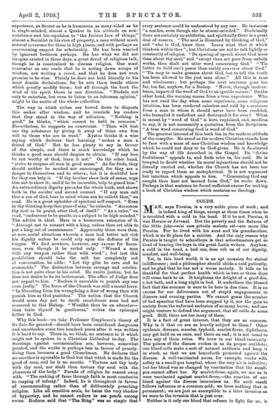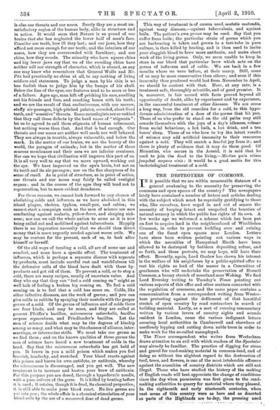COLDS.
it/IAN, says Penh's, is a very noble piece of work ; and
is indeed king of kings, except at those times when he is troubled with a cold in his head. If it be not Persius, it was Horace or JuvenaL But the poverty and the flatness of the little joke—nisi cum pituita molesta est—are more like Persius. For he lived with his aunt and his grandmother, which is no fit place for a satirist. And the only reason why Persius is taught to schoolboys is that schoolmasters get so tired of hearing the boys in the great Latin writers. Anyhow, a cold in the head, a bad one, does rob us of our dignity, comfort, and well-being.
Yet, in this hard world, it is an apt occasion for stoical indifference ; and a philosopher should abide a cold patiently, and be glad that he has not a worse malady. It bids UB be thankful for that perfect health which in two or three days will come back to us. It heightens the delight of a good fire, a hot bath, and a long night in bed. It underlines the blessed fact that the summer is sure to be here in due time. It is an excuse for our deliverance out of stupid engagements to dinners and evening parties. We cannot guess the number of bad speeches that have been stopped by it, nor the gain to society from the enforced seclusion of so many bores; and one might venture to defend the argument, that all colds do some good. Still, there are too many of them.
It is a fact of great interest, that they are so common. Why is it that we are so heavily subject to them ? Other epidemic diseases, measles, typhoid, scarlet-fever, diphtheria, may get hold on us once, and there an end; it is not usual to have any of them twice. We brew in our blood immunity. The poison of the disease evokes in us its proper antidote; our blood-cells make a sort of natural antitoxin and keep it in stock, so that we are henceforth protected against the disease. A well-vaccinated nurse, for example, works with safety in a small-pox hospital, where the very air is infective; but her blood was so changed by vaccination that the small- pox cannot affect her. By scarlet-fever, again, we are as it were vaccinated against scarlet-fever,—the reaction of our blood against the disease immunises us. No such result follows influenza or a common gold; we brew nothing that is permanent; we are just as susceptible to a later invasion as we were to the invasion that is just over.
Neither is it only our blood that ref uses to fight for us ; it
is also our throats and our noses. Surely they are a most un- satisfactory region of the human body, alike in structure and in action. It would seem that Nature is so proud of our brains that she has neglected the lower half of man's face. Consider our teeth, how ill they last ; and our jaws, how they afford not room enough for our teeth ; and the interiors of our noses, how they are overcrowded with furniture; and our chins, how they recede. The minority who have square chins and big lower jaws say that we of the receding chins have neither will nor strength of character, which is absurd, as any one may know who remembers that General Wolfe and Mr. Pitt had practically no chins at all, to say nothing of living soldiers and statesmen. To judge a man by his chin is no less foolish than to judge him by the bumps of his skull. Below the line of the eyes, our features tend to be more or less of a failure. Ages ago, man left off pricking his ears, smelling out his friends and foes, and cracking bones with his teeth ; and we are the result of that exclusiveness, with our narrow, stuffy air-passages, high-pitched palates, crowded, short-lived teeth, and "sensitive" throats. Some neurologists are so unkind that they call these defects by the hard name of "stigmata": let us be agreed to call them stigmata of human refinement, but nothing worse than that. And that is bad enough. Our throats and our noses are neither well made nor well behaved. They are always in trouble, always vulnerable, and below the mark. In the matter of our brains, we are the beauty of the world, the paragon of animals ; but in the matter of these mucous membranes and their uses we are inferior creatures. Nor can we hope that civilisation will improve this part of us. It is all very well to say that we move upward, working out the ape. We have improved on the ape's brain, but not on its teeth and its air-passages ; nor on the fine sharpness of its sense of smell. As in point of structure, so in point of action, our throats and our noses may fairly be called vestigial organs : and in the course of the ages they will tend not to regeneration, but to more evident decadence.
For these reasons, we cannot look forward to any chance of abolishing colds and influenza as we have abolished in this island plague, cholera, typhus, small-pox, and rabies ; we cannot start a campaign such as the men of science are now conducting against malaria, yellow-fever, and sleeping sick- ness; nor can we call the whole nation to arms as it is now being called out and mobilised against tuberculosis. Happily there is no imperative necessity that we should thus divert money that is more urgently needed against worse evils. We may be content for the present, each of us, to look after himself or herself.
Of the old ways of treating a cold, all are of some use and comfort, and none have a specific effect. The treatment of influenza, which is perhaps a separate disease with separate by-products, must include careful rest and watchfulness till the defensive cells of the blood have dealt with these by- products and got rid of them. To prevent a cold, or to stop a cold, there are many recipes, mostly of uncertain value. And they who say that they can "feel a cold coming on" might as well talk of feeling a broken leg coming on. To feel a cold coming on is to feel that a cold has come on. Colds, like other infective diseases, are the work of germs ; and you can give colds to rabbits by spraying their nostrils with the proper germs of a cold. Of the germs of influenza and of colds there are four kinds, and may be more, and they are called at present Pfeiffer's bacillus, micrococcus catarrhalis, bacillus toryzae segment osus, and Friecllander's bacillus. Let the men of science decide what may be the degrees of kinship among so many, and what may be the chances of alliance, inter- marriage, or internecine strife. We must take our germs as we find them ; and on the known qualities of these germs the men of science have based a new treatment of colds in the head. Say that the micrococcus catarrhalis has got hold of you. It brews in you a mild poison which makes you feel feverish, headachy, and wretched. Your blood reacts against this poison and brews its own antidote, or antitoxin, whereby the micrococeaas is discouraged, and you get well. The new treatment is to increase and hasten your brew of antitoxin. For this purpese you are dosed, through a hypodermic needle, with a pure culture of the germ. It is killed by heating before it is used ; it retains, though it is dead, its chemical properties ; it is still able to make your blood react. NO live germs are put into you ; the whole affair is a chemical stimulation of your blood-cells by the use of a measured dose of dead germs. This way of treatment is of course used, mv,tatis mutandis, against many diseases,—against tuberculosis, and against boils. The patient's own germs may be used. Say that you suffer from boils ; the particular strain of germs which you are harbouring is taken and grown in a test-tube in pure culture, is then killed by heating, and is then used to incite your sluggish blood to brew more antitoxin, and make short work of the living germs. Only, we seem unable to keep 'in store in our blood that particular brew which acts on the germs of influenza and of colds. We are back in a few months where we were before, at their mercy. Still, some of us may be more conservative than others ; and even if this immunity thus produced would last from November to April, we should be content with that. Here, at any rate, is a treatment safe, thoroughly scientific, and of good promise. It is, moreover, in fair accord with facts proved beyond all opportunity of doubt, alike by experiment and by experience, in the successful treatment of other diseases. We are come a long way, from the old remedies for a cold, to this hypo- dermic administration of a dose of the germs that bit you. Those of us who prefer to stand on the old paths may still console themselves with the joys of a day's idleness, release from social behaviour, a hot bath, a hot drink, and a ten hours' sleep. Those of us who love to try the latest results of science may add artificial immunity to their resources against a cold. They will snatch a fearful joy from it; and there is plenty of evidence that it may do them good. Of Mezentius, who occurs in the Aeneid, it is said that be used to join the dead to the living,—Mortua gam diem jungebat corpora vivis : it would be a good motto for this bacteriological treatment of a cold.











































 Previous page
Previous page